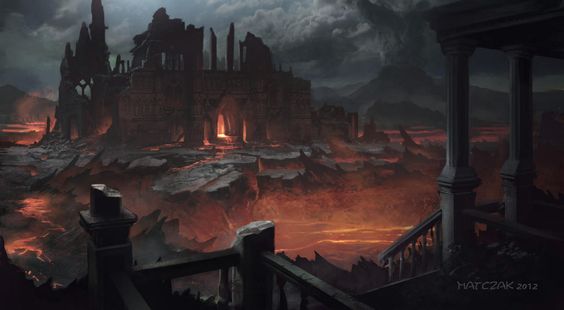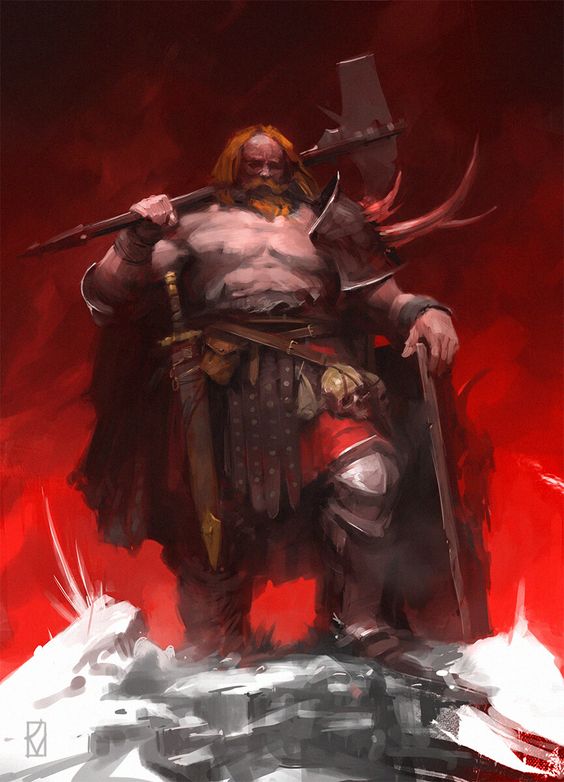Bruðmaðrsaga
The saga of Hróðvarr Bruðmaðr, the great Jotun warrior and figure who held the Hofsbrú bridge from the forces of the god Rymr during the Fall of Leirveðr. Hróðvarr Bruðmaðr would live on forever in tales of the giants for his legendary defense of defiance and selfless death.
Summary
In the realm of the giants of Leirveðr, there stood a great and powerful warrior. Hróðvarr the Vast they called him, for great was his strength and bravery. On the day when the treachery of Faragrim came to be, and the realm of King Víðvandr came to fall under the wrath of Rymr. Standing at the ready was Hróðvarr, hammer in hand, eager to meet the foe of the giants before the Arms of Járn. Determined to protect his kin, he rallied his fellow giants, urging them to prepare for the inevitable clash. With grim determination, they fortified their stronghold and readied themselves for the approaching storm. As the retinue of Rymr descended upon the land, Hróðvarr stood resolute on the Hofsbrú, the sacred bridge leading to the main gate of the city. Rymr, fueled by divine rage, sought to crush the giants and wipe away their memory. But Hróðvarr, undeterred, refused to yield, he sat then between the god and the gate to the city.
One by one, the retinue of Rymr came, the felled warriors of Ingavolla's long halls, the great Hersveitr warriors of the golden hall, now unleashed a torrent of fury. Yet, Hróðvarr met each onslaught with unwavering resolve and his hammer soaked in their dull blood. His massive frame shook with the impact of their blows, but he did not move back, an unbreakable bulwark against their red wrath. The battle raged on, with Hróðvarr's hammer striking with thunderous force. Hofsbrú itself quivered under the weight of stout Hróðvarr cleaving then the thegns of the storm god. Yet so did the bridge remain steadfast, perhaps envious of Hróðvarr's indomitable spirit. Giants and gods clashed in a tempestuous dance of war, the very ground trembling beneath their feet all around. As the tides of battle shifted, Hróðvarr found himself facing the mighty storm god alone. Now matched in might, Hróðvarr, wounded by arrow fire and ailing and tiring knew his last moments were at hand. But his heart burned with an unyielding flame of determination. Before the very mightiest of the gods, Hróðvarr, beating against his bare chest, and with rage that shook the heavens, let out a roar of anguish, defiant until the end.
Hróðvarr charged forward, his every strike done with the memory of his fallen kin. He fought for the legacy of the giants, and the honor of his people. In his final act of defiance, Hróðvarr poured all his fury against the storm god. Yet he knew that his efforts would be in vain, he was no match for the wrath of Rymr. Despite the overwhelming odds, brave Hróðvarr faced his fate with unwavering resolve, accepting that which awaited him. With a mighty clash, the onslaught of Magan's wielder consumed Hróðvarr, but not before he struck a blow that resounded throughout the realm. Now all stood away, in amazement, for Hróðvarr had bloodied Rymr with such a blow from his very fist.
All around many came to be astonished, for Hróðvarr then in a blink, looked down and his face came to a grim expression. He remained beaten and bloody, yet remained Hróðvarr, a pillar of stone. Forever unbroken he summoned the last vestiges of his mighty strength, he slammed his hammer down with a vengeance, snapping away the supports of the vast bridge, bringing it down, with all the hosts of Rymr upon it, and mighty Hróðvarr as well. The bridge shook, the sky wept, and Rymr himself was stunned by the valor of the lone giant, who had held not only his mighty host but even himself at bay, alone.
Cultural Reception
In the wake of his noble sacrifice, the giants who survived the destruction of Leirveðr, determined to honor their fallen champion, crafted towering statues of Hróðvarr that now, in the far north of Drauheim, stand guard over giant lands. These monuments, hewn from the rugged stone of the mountains, greeted travelers as they approached the pass of the mountains, a testament to the giants' resilience and the indelible mark Hróðvarr had left upon their collective souls.
These statues, with their imposing presence and outstretched arms, served as beacons of hope and guardians of the Jotnar's realm. Giant wanderers, guided by the stars, found solace in the sight of these statues, a symbol that they were approaching the realm of giants, a refuge and cradle of safety.
The Jotnar, in their enduring reverence for Hróðvarr, established rituals and traditions to pay homage to his memory. A common saying now in giant circles is that of the final words of brave Hróðvarr who admonished the cowardice of some of his fellow giants saying,
Stories of Hróðvarr's legendary feat echoed in the halls of the Jotnar, woven into their sagas and songs, passed down from generation to generation. His name became synonymous with resilience and unwavering defiance, a reminder of the enduring spirit that defined their race. Even as time passed and the statues of Hróðvarr came to be weathered by the winds and kissed by sea spray. They stood tall and still as a testament to the giants' undying pride, as guardians watching over the multitudes of passersby, keeping the name of the Bridgebreaker alive in memory still. And so, as travelers caught sight of those statues on the horizon, a mix of trepidation and awe would fill their hearts. They would remember the tale of Hróðvarr Bruðmaðr, the giant who had defied the wrath of Rymr and defended his kin, and they would be reminded of the indomitable spirit that resided within the hearts of the Jotnar. "Hróðvarr at the Bridge" came to be an often quoted saying among the giants and inspires a profound sense of bravery, resilience, and unwavering defense. It symbolizes the necessity of sacrifice, something all too familiar to the giants, reminding one of Hróðvarr's legendary last stand at the bridge. The phrase would be uttered with reverence and admiration, embodying the spirit of indomitable strength and steadfastness in the face of adversity."How can one die better, than for the ashes of his fathers?"
In Art
The Hávörðir- The High Guardians, the wardens of the mountain beyond the Norðurskarð and into giant territory.
(Hróðvarr Bruðmaðr, the Bridgebreaker)
(Rymr, destroyer of Leirveðr and foe of Hróðvarr)
(King Víðvandr, kinsman of Hróðvarr and King of Leirveðr)
(The Járnhendur, the walls of Leirveðr, smashed and torn asunder by Rymr)
Date of Setting
3025 B.E
Related Species
Related Locations
Related People







Comments